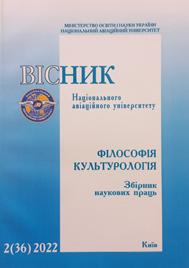METADISCIPLINARITY OF MODERN PHILOSOPHY IN OPTICS OF PRACTICAL DIMENSIONS
DOI:
https://doi.org/10.18372/2412-2157.36.16970Keywords:
dialogue, interdisciplinarity, intercultural communication, polydisciplinarity, polydiscursiveness, polylogue, practice, trendAbstract
In the introduction, the article considers issues related to the current challenges of transformation in the fields of modern humanities and
philosophy in metadisciplinary dimensions. The aim of the research is to explore new optics of philosophical metadisciplinarity on the
horizon of intercultural communication and educational practices in modern higher education. The problematics of the article involve the use
of interdisciplinary research methods: structuralist-phenomenological, logical-analytical, ethical-axiological, cultural-philosophical, hermeneutic-
ontological, and comparative. In the research results, special attention is paid to the correlation between the primary groups of
concepts present in the article, such as intersubjectivity / interculturality; common world / interworld / interdisciplinarity; multidisciplinarity /
metadiscursiveness. The article introduces the author's ideas regarding the need for reactualization at the level of meta- and multidisciplinarity
of modern philosophical studies in the light of practical dimensions of teaching philosophical disciplines in higher education.
The substantiation of problems in the inter-/ transdisciplinary vector is exemplified in the analysis of teaching the discipline “Philosophy of
science and methodology of humanitarian knowledge” for training doctors of philosophy at the Kyiv National Linguistics University. The
discussion demonstrates the approbation dimensions of metadisciplinary trends in philosophy and humanities exemplified in scientific and
practical conferences and educational practices in modern higher education. The conclusions demonstrate that modern multimodal
combinations of specific scientific knowledge and the categorical apparatus of philosophy contribute to the emergence of innovative
metadisciplinary trends, and the future of both science and philosophy is based on inter-, poly-, and meta-discursiveness.
References
Castells М. The Rise of the Network Society, The Information Age: Economy, Society and Culture. Vol. I. Cambridge, MA; Oxford, UK, 2000. 597 р.
Sartre J.-P. L'Être et le néant: essai d'ontologie phénoménologique. Рaris: Gallimard, 2017. 848 р. 3. Sleigh S. How Popperian falsification enabled the rise of neoliberalism. 2021. Available at: https://aeon.co/essays/howpopperian-falsification-enabled-the-rise-of-neoliberalism
Вальденфельс Б. Топографія Чужого: студії до феноменології Чужого / пер. з нім. В. Кебуладзе. Київ : ППС, 2004. 206 с.
Вахтель А. Сучасна українська феноменологічна термінологія і підходи до перекладу «Картезіанських медитацій» Едмунда Гусерля. Sententiae. Том 38 : 2. 2019. С. 37-50.
Гусерль Е. Ідеї чистої феноменології і феноменологічної філософії. Книга 1. Загальний вступ до чистої феноменології. / пер. з нім. В. Кебуладзе. Харків : Фоліо, 2021. 348 с.
Ґадамер Г.-Ґ. Значення гуманістичної традиції для гуманітарних наук. Т. 1. Істина і метод. Основи філософської герменевтики. / пер. з нім О. Мокровольського. Київ : Юніверс, 2000. С. 13-48.
Єрмоленко A. Інтеріоризація інтерсуб’єктивності в «Я» - концепті та співвідповідальність у трансцендентальній прагматиці: Сучасна філософія розуму: перспективи розвитку. Філософська думка. № 6. 2021. С. 6-15.
Комісар Л. П. Гіперреальність і/як «реальна віртуальність» в горизонті трансдисциплінарності сучасної філософії. Ad orbem per linguas. До світу через мови. Матеріали Міжнародної науково-практичної відеоконференції. Київ : Вид. центр КНЛУ, 2022. С. 116-118.
Комісар Л. П. Про сучасну філософію, університет і компетентнісний підхід у філософській освіті. Університетська кафедра. № 6. 2017. С. 129-136.
Крістєва Ю. Самі собі чужі / пер. з фр. З. Борисюк. Київ: Основи, 2004. 262 с.
Пучкова Д. Д. Постнекласичний тип раціональності: полі-, між-, транс- та метадисциплінарність. Вісник національного
авіаційного університету. Серія: Філософія. Культурологія. 2 (32). НАУ, 2020. С. 93-97.

